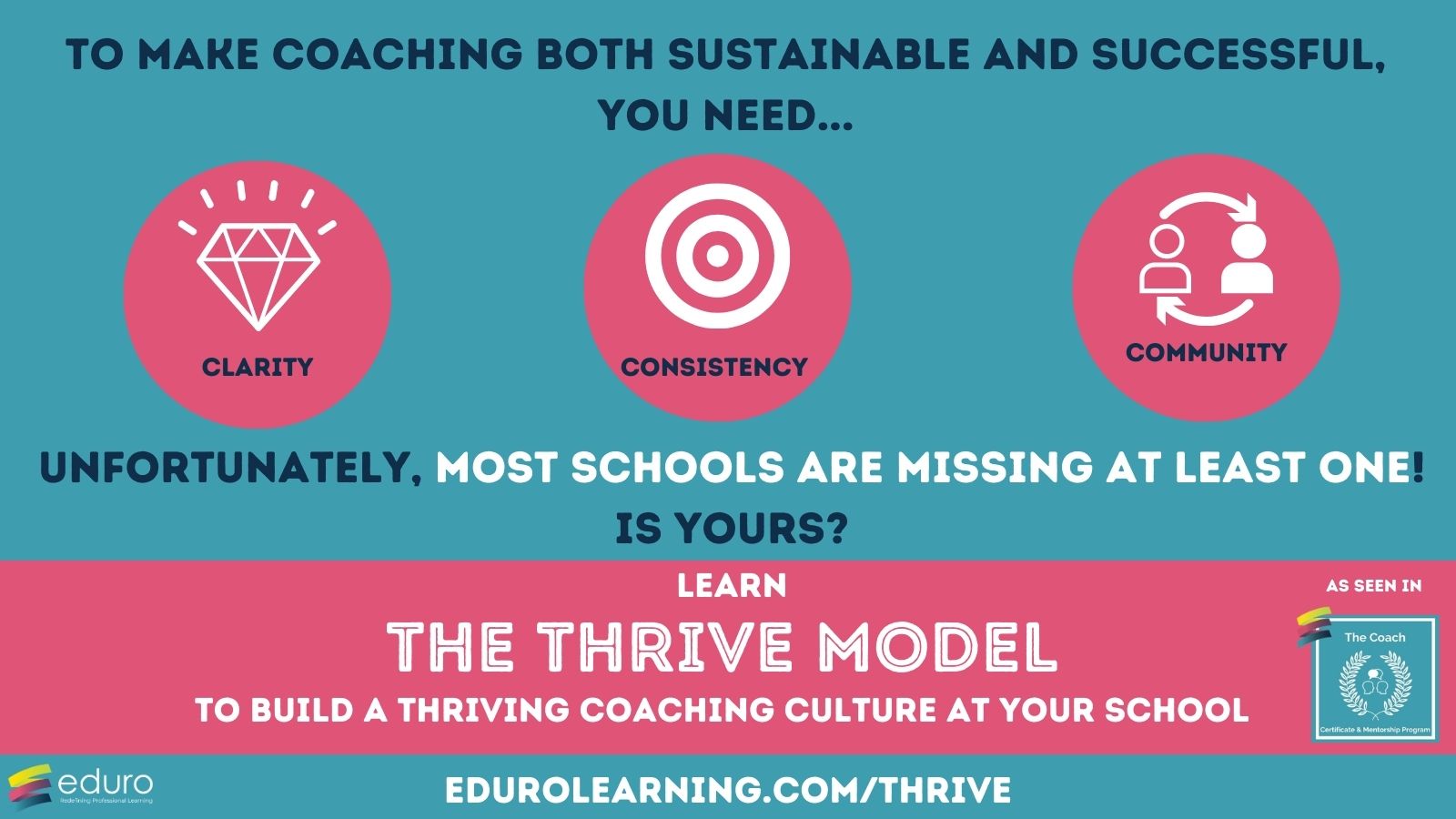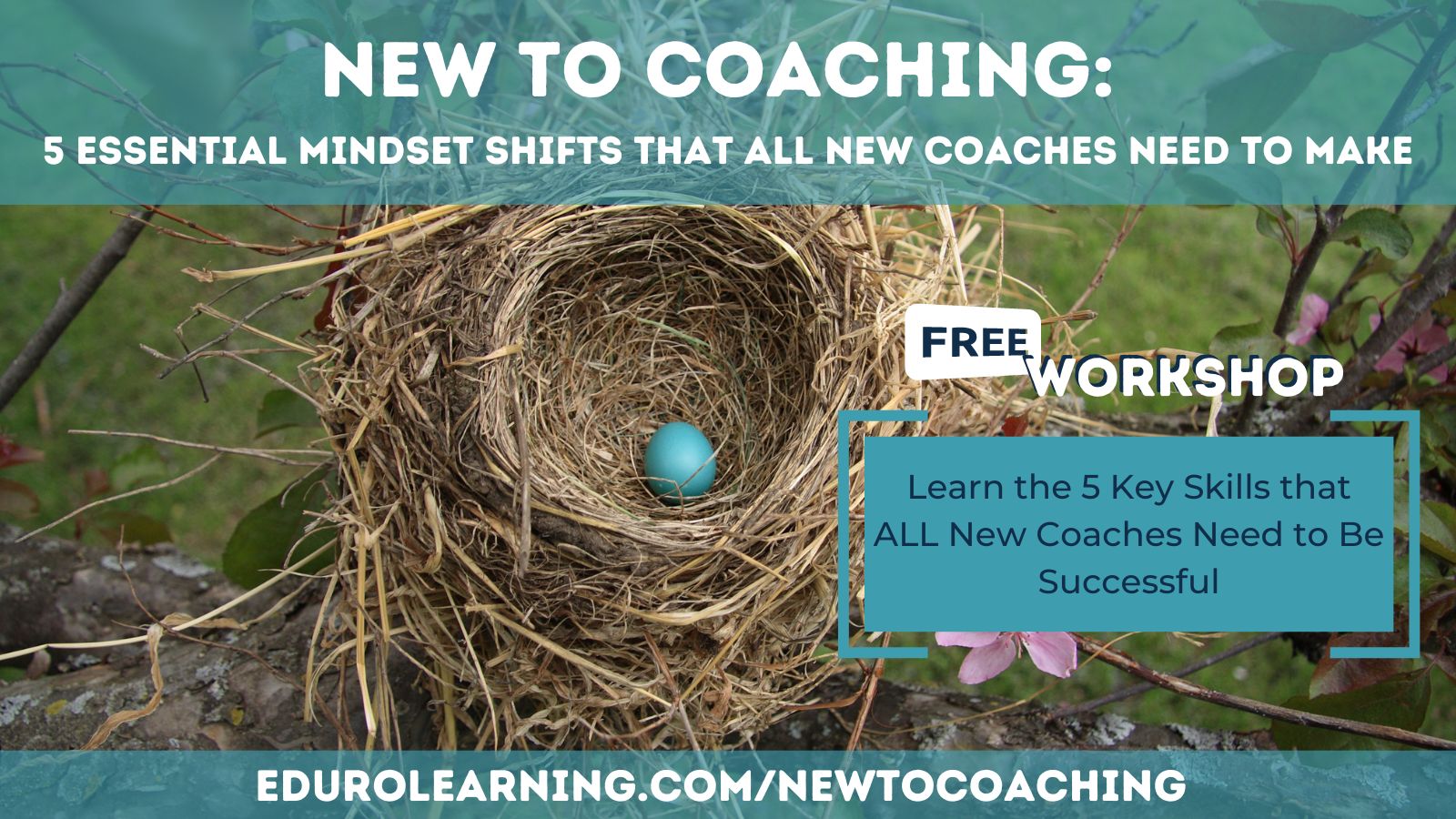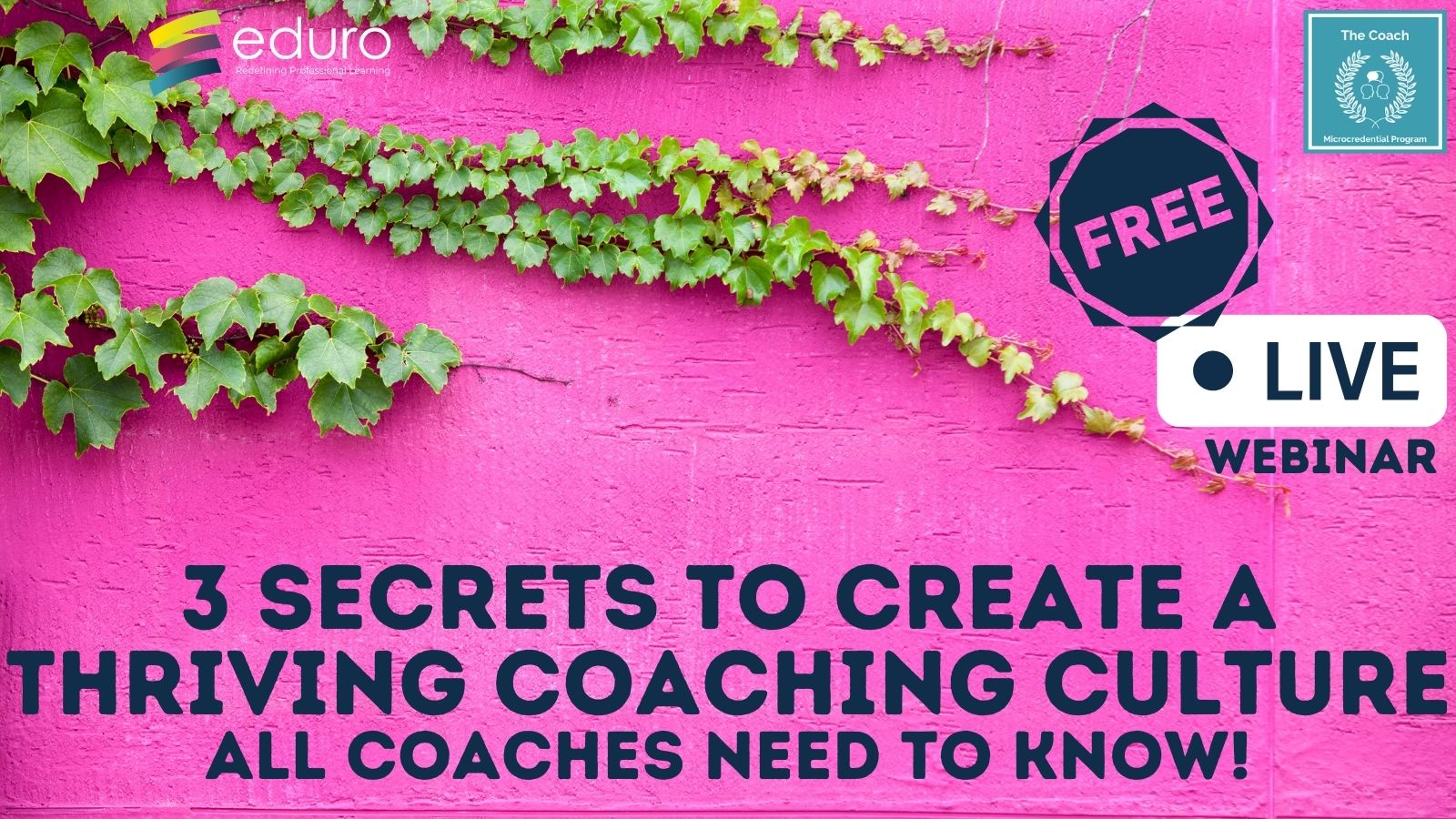In this #coachbetter episode, Kim talks with Carla Marschall, Director of Dresden International School in Germany. Carla brings a systems-thinking view to everything she does, and the implementation of coaching in her school is no exception. On this call, they talk about how Carla is working to create a coaching culture, communicate the vision, put structures and policies in place to make it successful, and why coaching is so essential in our schools.
This episode is full of big-picture thinking about how to develop a coaching program from scratch. If you are curious about the systems and structures that make coaching successful, this episode is for you!
Connect with our Featured Guest
Subscribe to #coachbetter via your favorite Podcast Player!
Bonus! Watch the Spotlight Version on YouTube!
SHOW NOTES
Please tell us a little bit about where you are right now, and the coaching culture at the school when you arrived…
Last 7 years at UWC in Singapore at East Campus. When James came to UWC he worked really hard on shaping culture through Adaptive Schools and CC. Allows individuals to engage in deep listening and collaboration. Had seen the value of that in my previous school environment. Dresden hadn’t had the opportunity to reflect on itself as a learning organization and what that means in terms of our interactions, structures, and systems.
How does coaching support this notion of a learning organization? How do we move DIS to identify as a learning organization where growth is baked into our structures? How can we intentionally craft a culture of learning?
Please share an overview about the work you’re doing now to develop a coaching culture (and then we’ll dig into more detail)…
Approaching this with a sense of curiosity and sense of intentionally that exists in opportunity. Growth focus with all policy development.
Review of Positions of Responsibility (review every 2 years): embedding coaching mindset as something that’s explicit
EdTech Integration Specialist: reshaped as Digital Learning Coordinator – bringing learning into job title, moved away from more tool-based focus to working with humans.
Use coaching as an approach to build individual and team capacity related to area of responsibility
Social and Emotional Wellbeing, Coordinator roles, HoDs
These individuals provide an opportunity to build capacity. Not a deficit
Policies: educational access policy: SST: coaching teachers is part of that role
Professional Growth for teacher supervision: goal-based: 3 conversations between teacher & line manager (AP or Principal about goal and how that person imagines developing the goal over time, mid-year and end of year, what growth has happened, and where they might want to go) –
For Professional Growth, a planning conversation & reflection conversation provide a scaffold that can enable a sense of safety. It’s a map, it allows a person to know where a conversation is going to go. When we use protocols and structures, it allows people to feel a sense of security.
Hosted a regional CC workshop for the first 4 days of the foundation seminar, 9 educators went, she’s coming back. Create a critical mass, you need to have had enough people with the skills of paraphrasing to where it becomes embedded in the culture.
We are building organizational awareness about what coaching is and how it can be beneficial in terms of understanding ourselves and our colleagues. Focusing on
Communicating this vision
Shared that she was coming & anyone can put forward an expression of interest. Early adopters: Need people to self-select & volunteer. Creating systemic change, need early adopters to self-select. Applied, and then selected based on positions of responsibility.
You can be genuinely giving your time as a listener.
What might schools want to think about to ensure that coaching can be successful?
You need an umbrella under which coaching fits. Framing it as “we are a learning organization” (using Peter Senge’s definition). This is a tool for us as an organization to grow in order to meet our mission. Coaching is one of the things we use to meet our goals.
Systems leadership is another thing. You can not control a system, it’s not hierarchical (it’s a circle shape, not a triangle). There are lots of interactions and connections between people and parts within an organization. If you want to make change in an organization, you have to think about how the interactions between individuals impact the purpose of the organization.
You have a fundamental shift from a transactional way of interacting to a more meditative way of interacting. Coaching enables us to create lots of agents of change who are doing good work through deep listening, paraphrasing, questioning which shapes the culture of an organization.
Senge is a big proponent of systems thinking.
Coaching allows us to listen to each other, pose really strong questions, without judgment or advice. We might choose to collaborate as opposed to coaching
How did you do this?
Position myself as a listener – what’s working well and why, what might you change and why, if you had a magic wand, what would be your priority area? 35 individual conversations. Shadow a student challenge (keeping the student perspective at the forefront). Put the value in listening and understanding before taking action.
Pitch my clothing to the culture of the school. Working against the mental models that people hold about school directors. I’m not the suit who’s the formal distant leader. I’m trying to interact on the level of students
EXPLORE THE THRIVE MODEL
Are you working on building a coaching culture in your school setting?
To make coaching both sustainable and successful, you need clarity, consistency, and community.
Unfortunately, most schools are missing at least one! Is yours?
Use the Thrive Model to find out!
Developed after working with hundreds of coaches and leaders in international schools around the world, the Thrive Model incorporates both the macro view of a coaching program, and the micro view of a coaches practice, to bring together the three essential elements to make coaching both sustainable and successful.
Explore all of our resources about the Thrive Model at edurolearning.com/thrive

SHOW NOTES continued…
You have done (and continue to do) lots of accreditation work, what do you see in schools that have a coaching culture compared to schools that don’t?
How do you help school leaders move this forward so it’s not performative and tokenistic?
High self-awareness on the part of the leader, so they understand what they’re bringing to the organization. If they don’t have self-awareness of their own listening, how they understand others, how they can be generous with their time.
Providing opportunities for leaders to see the benefit of coaching and learn how to be a better listener through coaching – but they have to be willing to give up their time. Craft & facilitate meetings using a coaching strategy: guiding questions that are meditative, data on the table, use of protocols, paraphrasing, don’t just walk out of the room at the end, take 10 minutes to talk about how the process impacted our understanding
What Professional Learning and support structures are you putting in place to enable individuals to move forward?
We haven’t yet discussed what the structure for coaching will look like next academic year, how people will access coaching conversations, how invitational we’ll make it. Teams vs individual.
We’re introducing coaching in a mix of ways: formal and informal, individual and with teams. Mix of informal and formal structures. If there’s a veil hiding what coaching is because people have never experienced it, it’s hard for people to know its value, so we want to start with teams, so everyone gets the experience. But we don’t want to be heavy-handed and force people. We want to provide informal channels for people to have coaching conversations about their practice.
What are some other angles?
Accreditation domain meeting with CIS, so it doesn’t feel like a check box activity. Who might be our domain leads, using this mindset of coaching skills.
Hosting the first-ever presencing institute Theory U next November, Auto Scharmer – a book about systems leadership. Observe observe observe. Embedding and immersing ourselves in a system to pull out patterns and trends to lead for an emerging future. Brings together body and meditative.
Why should all international schools consider bringing coaching?
Two aspects that sound different, but they’re related. One is organizational effectiveness: if we can listen better and understand each other better, we will work together better. That’s one piece, but we shouldn’t just be goal-driven and efficiency mavens because that’s very dehumanizing. Coaching brings an element of selflessness and generosity, listening is an act of compassion because it is about removing the self from us and about providing space for the other individual. If we want to develop organizations that are humanizing but effective, coaching is one of the ways we can do that.
The mindset has to be one of developmental growth. If we position ourselves as leaders within that mindset we try things.
Ready to learn more about creating a coaching culture?
If you’re ready to dig deeper into how Clarity, Consistency, and Community can help you promote a coaching culture in your coaching role and your school or organization – or if you’re new to instructional coaching and you’re curious about getting started, join us for one of our courses for coaches!
One of the things we’re most proud of here at Eduro is that there’s no one-size-fits-all learning – you always have choice and voice in how you learn with us. Today’s video highlights one of the key themes that you’ll find in three of our programs, and if you’re curious to take your learning deeper, we have three great options for you.
New Coaches:
If you’re just getting started as a coach, and you want to learn how to make these mindset and skillset shifts, watch our New to Coaching Workshop, which will also tell you all about our brand new course, Getting Started as a Coach.

Experienced Coaches:
If you’re already a coach & you want to think about being more intentional & strategic in your practice, watch our workshop on the Thrive Model for Coaching Success which will help you evaluate your program to see where you may have room to grow – and help you decide if our year-long mentorship and certification program, The Coach, is right for you, right now

Just like all our learning experiences, the content in both of these courses is self paced so you get access to everything immediately – but you get so much more: when you join the course, you get access to our #coachbetter global community with optional group coaching calls at various time zones to meet & connect with other coaches PLUS private office hours with me to get all your questions answered & work through anything coaching related in your unique school context.
Wherever you are in your coaching journey, we can support you!
For All Coaches
Connect with us!
- Subscribe to the podcast iTunes | Spotify | Stitcher
- Follow us on social media: Twitter | Instagram | LinkedIn
- Join our #coachbetter Facebook group
- Explore our courses for coaches
![Building a Culture of Coaching with Carla Marschall [Ep 223]](https://res.cloudinary.com/edurolearning/image/upload/v1692248873/coachbetter%20Podcast/Carla_Marschall_nx108o.jpg)




Recent Comments